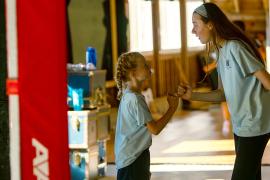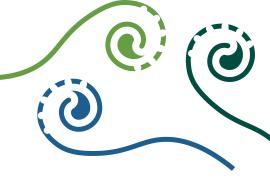We can't really define it, but we know it when we see it. We lament the loss of it to our friends and neighbors as we continually look for new ways to build it. What is IT? It is a sense of community! Within organized camps, professionals have long advocated the link between sending a kid to camp and learning the skills necessary to be a part of, as well as give back to, a community.
Parents have also identified the development of social skills (such as making new friends, getting along with others, becoming more responsible, and learning group-living skills) as one of the main reasons they send their children to camp (Halliday 1991). One important means to facilitate these benefits is the small group experience within a camp setting. Kraus and Scanlin (1983) identify the small group living experience as one of the most unique and powerful aspects of camp life.
Within such small groups, children learn to work together to make group decisions and work through problems and conflicts. Through this process, children learn to live by the will of the majority, while at the same time respecting the needs of others who represent the minority. The small group also provides the necessary intimacy for individuals to achieve a sense of belonging, explore a variety of group roles, cooperate and form relationships with others, and have input into the group's activities. Through group decisions, group members learn to accept responsibility for both personal and group actions.
In today's world, camp directors must be able to articulate the value of the small group experience in contemporary terms. One such term receiving increasing attention today is social capital, defined as "features of social life — networks, norms, and trust — that enable participants to act together more effectively to pursue shared objectives (Putnam 1995)." In recent years, scholars in many fields have begun to document that social capital is as important as economic capital for successful societies.
Despite the belief in the many benefits of the small group experience in camps (e.g., building social capital), little empirical research actually exists to document an increase in campers actually getting involved in their communities after they return from camp. This article explores the connection between camps and social capital, provides an example using a case study of a camp in Romania that is actively measuring the social benefits of their programs, as well as offers practical applications for camps to maximize their social impact during and beyond the camp experience.
Social Capital and Camps: Think of the Possibilities
The definition of social capital implies that relationships are fundamental to pursue shared objectives. Just as campers need to work together in small groups in the camp setting, societies must also look for ways to come together to work for the common good. Therefore societies must look for ways to teach children the skills needed to be actively engaged with their communities. This includes such social elements as trust building, connections with others, diversity of friendships, participation in politics, giving and volunteering, faith-based engagement, and civic engagement across the community.
These connections have become more important in a time when the loss of community has been increasingly recognized. Putnam (2002) documents the decline of social capital in America as reflected by decreasing membership in voluntary organizations such as the Boy Scouts, the League of Women Voters, Parent-Teacher Associations, and the American Red Cross. Putnam's work has generated much debate on whether social capital is really declining or just changing into new ways for people to connect. As this debate plays out, there is consensus that social capital is an important concept that requires continued study in all aspects of society, including organized camps.
Case Study: One Camp's Efforts to Develop Caring Citizens Who Feel Empowered to Act
An example of a camp that is documenting its response to the need to build social capital in campers is the Viata program in Lupeni, Romania. This program is unique in its mission to develop caring citizens who feel empowered to act. Romania offers an interesting backdrop to this program. Though communism fell in Romania in 1989, it has left a lingering mark on Romanian culture. Civic apathy, interpersonal suspicion, and Machiavellian/ predatory ethics all make trust, and therefore sustainable development, difficult. A World Values survey from 1999 found Romania at the bottom of all European cultures in terms of interpersonal trust. A 2004 poll revealed a staggering 50 percent of the Romanian population believes that one becomes successful by stealing and breaking the law. In responding to this environment, Viata is working to develop personal and interpersonal skills among its youth through adventure education and service learning. They are equipping Romanian youth with the skills, (inter)personal trust, and confidence to address the issues of poverty, child abandonment, environmental degradation, and corruption.
In an effort to document the benefits of this program, the camp initiated a study of 327 Romanian youth to see if there was a significant difference in social capital between campers entering and exiting one of their one-week programs. The survey measured social capital by asking questions on four dimensions: interpersonal trust, team building, participant perception of his or her own qualities and abilities, and empowerment.
Results indicated there was a significant difference in social capital scores between pre- and post-test scores for those who had participated in the one-week camp. Upon further examination, this change in social capital could be a result of the interpersonal trust dimension, which has been identified as one of the most important components of social capital as it contributes to the development of other values and abilities (e.g., empowerment and teambuilding, cooperation). In this specific study, data indicated that interpersonal trust increased in campers by 23 percent following the experience. The other three dimensions (team building, self-perception of his or her own qualities and abilities, and empowerment) also showed some increase over the course of the experience.
A second finding of the study indicates that youth who had participated in previous experiences emphasizing cooperation among group members had a higher level of trust entering this camp experience than youth who had never participated in such activities — thus indicating that the more youth are exposed to camp experiences, the greater the opportunity to develop interpersonal trust with others.
These findings should be encouraging to camps everywhere in that this study indicates that camps can impact social capital by building the trust necessary to encourage civic society. In addition, the Viata program works hard to create a process for campers to get involved in their local communities after the camp experience. This process manifests itself through partnerships with a network of both local and national youthserving organizations, which sponsor service learning through a unique service learning model called IMPACT (www.new-horizons. ro). IMPACT programs are intentionally addressing social capital development through service projects that are structured to engage and bridge out to others in the community. At this point, early research is indicating that IMPACT is fostering longterm civic engagement in participants.
Practical Applications
Trying to understand social capital and its impact on both civic engagement and developing community is well within the mission of organized camps within the United States. This includes providing children and adults with lessons in community, character building, skill development, and healthy living. As camps intentionally work to provide these growth elements, they are also empowering youth to increase civic engagement and build social capital.
In offering specific ways to build social capital through the camp experience, we will use the framework put forth in a recent study of the American Camp Association® and Youth Development Strategies entitled Innovations: Improving Youth Experience in Summer Programs. Within this study, the four supports and opportunities to improve the camp experience are: supportive relationships, safety, youth involvement, and skill building. Within these opportunities we will focus on strategies to foster social capital and civic engagement in three of the four opportunities (supportive relationships, youth involvement, and skill building) as well as in general camp management.
Camp Management
Overall organization of the camp program includes broad policies and procedures in administrating organized camps.
- Model engagement with staff, giving them opportunities to have input and to develop skills in engaging others in working on a common project or program. For example, during training, develop strategies whereby staff can plan and impact the upcoming summer program.
- Assist counselors to understand social capital and how camps can contribute to building social capital through staff training. (See the sidebar Group Juggling for an example of a staff training activity that introduces the concept of social capital.)
Meaningful Opportunities for Involvement and Membership
Camp can:
- Create opportunities for input and decision-making for participants. For example, use camper and counselor feedback to improve programs demonstrating that their involvement can make a difference.
- Create opportunities for leadership and involvement. For example, give older campers roles in the day-to-day running of camp (planning a program for younger campers), so they learn management skills and begin to take ownership of their experience and the experiences of others.
- Identify possible partners to create after-camp opportunities for engagement. For example, the Viata program has identified other youthserving organizations around the country to participate in their program as a group and return as a group to get involved in their communities through IMPACT Clubs (see the sidebar Civic Engagement Examples of IMPACT Clubs).
Developing Social Skills
These skills include cooperation, decisionmaking, listening, encouraging, taking turns, communicating, resolving conflicts, etc. Camps can foster the development of a wide range of social skills in the following ways:
- Offer choices in program time (to be completed by cabin groups) to help campers develop skills for engaging others in working on a common project or program.
- Encourage campers to set both individual and group goals at the beginning of the experiences and set a time to review those goals at the end of the experience.
Fostering Supportive Relationships
This study showed the importance of trust in fostering supportive relationships. Possible ways in which a camp can foster trust include:
- Design gathering places where campers and staff can hang out in an informal setting.
- Offer program opportunities where campers can develop trust in each other by engaging in activities where they must rely on others for their safety and success.
- Design programs to build relationships. For example, even during free times, assign staff roles to interact informally with campers.
The Power of Camp
For camps in the United States, the lessons learned in Romania reinforce the belief in the power of camps to promote social capital and develop the skills necessary in young people to sustain democratic living. In the words of Mahatma Gandhi, "You must be the change you want to see in the world." Camps must work intentionally to create what they value. This article focused on social capital as one important outcome of the camp experience. Trying to understand social capital and its impact on both civic engagement and developing community is well within the mission of organized camps to provide children and adults with lessons in community, character building, skill development, and healthy living. Through the building of community and the development of skills and character, youth and adults gain the skills necessary for change in their community.
References
Halliday, N. (1991). Learning through small group experiences. Camping Magazine, 63 (8) 16-20.
Kottman, T.; Ashby, J.; DeGraaf, D. (in press). More Adventure in Guidance: Integrating Fun Into Your guidance program. Alexandria, VA: American Counseling Association.
Kraus, R. & Scanlin, M. (1983). Introduction to Camp Counseling. New Jersey: Prentice-Hall.
Putnam, R. (1995, January). Bowling Alone: America's declining social capital. Journal of Democracy.
Putnam, R. (2000). Bowling Alone: The Collapse and Revival of American Community. New York: Simon and Schuster.
Youth Development Strategies. (2006). Innovations: Improving youth experience in summer programs. American Camp Association.
Lauren Colyn is a sociology major at Calvin College.
Don DeGraaf, Ph.D., is a professor at Calvin College with over fifteen years of experience working in organized camp.
Diana Certan is a program coordinator for New Horizons, a Romanian nonprofit organization that sponsors the Viata program.
Originally published in the 2008 March/April issue of Camping Magazine.




